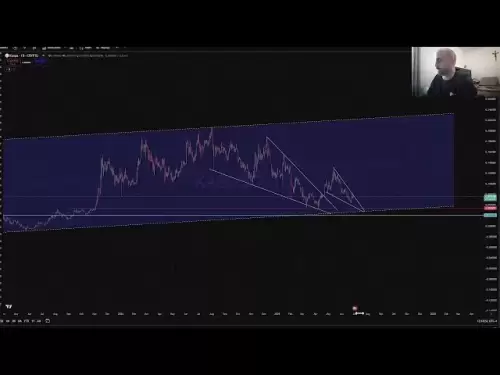-
 Bitcoin
Bitcoin $107,341.7259
0.15% -
 Ethereum
Ethereum $2,438.6204
0.70% -
 Tether USDt
Tether USDt $1.0003
-0.02% -
 XRP
XRP $2.1866
1.94% -
 BNB
BNB $649.0952
0.36% -
 Solana
Solana $150.9602
5.63% -
 USDC
USDC $0.9999
0.00% -
 TRON
TRON $0.2742
0.40% -
 Dogecoin
Dogecoin $0.1645
1.93% -
 Cardano
Cardano $0.5669
1.18% -
 Hyperliquid
Hyperliquid $37.8286
4.19% -
 Bitcoin Cash
Bitcoin Cash $491.4669
-2.74% -
 Sui
Sui $2.8150
3.06% -
 Chainlink
Chainlink $13.4184
2.91% -
 UNUS SED LEO
UNUS SED LEO $9.0809
0.27% -
 Avalanche
Avalanche $18.0295
2.60% -
 Stellar
Stellar $0.2396
1.19% -
 Toncoin
Toncoin $2.8587
0.13% -
 Shiba Inu
Shiba Inu $0.0...01160
2.59% -
 Litecoin
Litecoin $86.4192
1.45% -
 Hedera
Hedera $0.1486
1.19% -
 Monero
Monero $308.4324
0.87% -
 Polkadot
Polkadot $3.4202
1.43% -
 Bitget Token
Bitget Token $4.6436
-0.34% -
 Dai
Dai $0.9998
-0.02% -
 Ethena USDe
Ethena USDe $1.0002
0.00% -
 Uniswap
Uniswap $7.1527
3.29% -
 Pi
Pi $0.5357
-8.45% -
 Pepe
Pepe $0.0...09588
4.61% -
 Aave
Aave $259.9759
0.81%
How to calculate Bybit grid trading income? Formula and case
Bybit grid trading profits from crypto volatility using a grid of buy/sell orders; income is calculated by summing profits from each grid level transaction.
May 09, 2025 at 10:35 pm
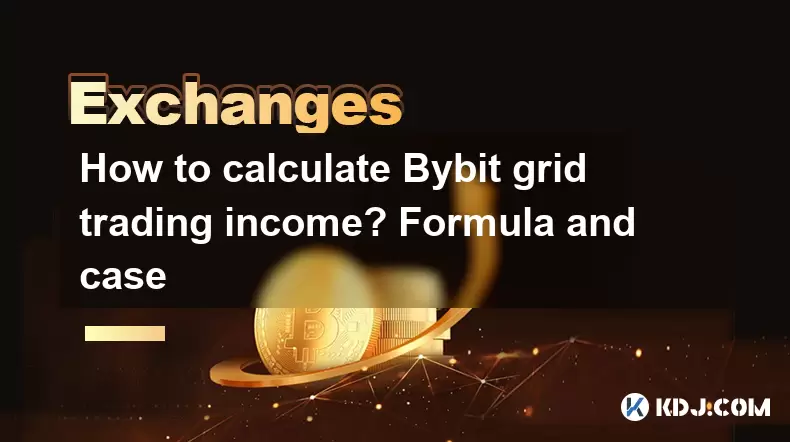
Understanding Bybit Grid Trading
Bybit grid trading is a popular strategy among cryptocurrency traders that involves setting up a grid of buy and sell orders at predefined price levels. This automated trading method aims to profit from the natural volatility in cryptocurrency prices. To calculate the income from grid trading on Bybit, it's essential to understand the mechanics of grid trading and the variables involved in the calculation.
Key Components of Grid Trading
Before diving into the income calculation, let's explore the key components of grid trading:
- Upper and Lower Price Limits: These define the range within which the grid operates.
- Number of Grids: This determines how many buy and sell orders are placed within the price range.
- Grid Spacing: The difference in price between each grid level.
- Investment Amount: The total amount of cryptocurrency or fiat currency invested in the grid.
Formula for Calculating Grid Trading Income
The income from grid trading can be calculated using the following formula:
[ \text{Income} = \sum (\text{Sell Price} - \text{Buy Price}) \times \text{Quantity Traded} ]
Where:
- Sell Price is the price at which the cryptocurrency is sold.
- Buy Price is the price at which the cryptocurrency is bought.
- Quantity Traded is the amount of cryptocurrency traded at each grid level.
Step-by-Step Calculation Process
To calculate your grid trading income on Bybit, follow these steps:
- Identify the Grid Parameters: Determine the upper and lower price limits, number of grids, and grid spacing.
- Track Each Transaction: Record the buy and sell prices and quantities for each grid level.
- Calculate Profit for Each Grid Level: Use the formula above to calculate the profit for each transaction.
- Sum Up the Total Income: Add up the profits from all grid levels to get the total income.
Case Study: Calculating Bybit Grid Trading Income
Let's consider a practical example to illustrate how to calculate grid trading income on Bybit.
Assume you set up a grid trading strategy for Bitcoin (BTC) with the following parameters:
- Upper Price Limit: $50,000
- Lower Price Limit: $40,000
- Number of Grids: 10
- Grid Spacing: $1,000
- Investment Amount: 1 BTC
Here’s how the grid would look:
- Grid 1: Buy at $40,000, Sell at $41,000
- Grid 2: Buy at $41,000, Sell at $42,000
- Grid 3: Buy at $42,000, Sell at $43,000
- Grid 4: Buy at $43,000, Sell at $44,000
- Grid 5: Buy at $44,000, Sell at $45,000
- Grid 6: Buy at $45,000, Sell at $46,000
- Grid 7: Buy at $46,000, Sell at $47,000
- Grid 8: Buy at $47,000, Sell at $48,000
- Grid 9: Buy at $48,000, Sell at $49,000
- Grid 10: Buy at $49,000, Sell at $50,000
Now, let's assume that the market price fluctuates within this range and triggers transactions at each grid level. For simplicity, we'll assume that each grid level is fully executed once.
- Grid 1: Buy 1 BTC at $40,000, Sell 1 BTC at $41,000
- Profit = ($41,000 - $40,000) × 1 BTC = $1,000
- Grid 2: Buy 1 BTC at $41,000, Sell 1 BTC at $42,000
- Profit = ($42,000 - $41,000) × 1 BTC = $1,000
- Grid 3: Buy 1 BTC at $42,000, Sell 1 BTC at $43,000
- Profit = ($43,000 - $42,000) × 1 BTC = $1,000
- Grid 4: Buy 1 BTC at $43,000, Sell 1 BTC at $44,000
- Profit = ($44,000 - $43,000) × 1 BTC = $1,000
- Grid 5: Buy 1 BTC at $44,000, Sell 1 BTC at $45,000
- Profit = ($45,000 - $44,000) × 1 BTC = $1,000
- Grid 6: Buy 1 BTC at $45,000, Sell 1 BTC at $46,000
- Profit = ($46,000 - $45,000) × 1 BTC = $1,000
- Grid 7: Buy 1 BTC at $46,000, Sell 1 BTC at $47,000
- Profit = ($47,000 - $46,000) × 1 BTC = $1,000
- Grid 8: Buy 1 BTC at $47,000, Sell 1 BTC at $48,000
- Profit = ($48,000 - $47,000) × 1 BTC = $1,000
- Grid 9: Buy 1 BTC at $48,000, Sell 1 BTC at $49,000
- Profit = ($49,000 - $48,000) × 1 BTC = $1,000
- Grid 10: Buy 1 BTC at $49,000, Sell 1 BTC at $50,000
- Profit = ($50,000 - $49,000) × 1 BTC = $1,000
Total Income = $1,000 + $1,000 + $1,000 + $1,000 + $1,000 + $1,000 + $1,000 + $1,000 + $1,000 + $1,000 = $10,000
Factors Affecting Grid Trading Income
Several factors can impact the income from grid trading:
- Market Volatility: Higher volatility can lead to more frequent trades and potentially higher income.
- Transaction Fees: Bybit charges fees for each buy and sell transaction, which can reduce overall income.
- Grid Settings: The choice of upper and lower price limits, number of grids, and grid spacing can significantly affect the outcome.
Practical Tips for Optimizing Grid Trading Income
To maximize your income from grid trading on Bybit, consider the following tips:
- Monitor Market Trends: Keep an eye on market trends to adjust your grid parameters accordingly.
- Optimize Grid Spacing: Experiment with different grid spacings to find the most profitable setup for the current market conditions.
- Manage Risk: Set stop-loss orders to protect against significant losses if the market moves outside your grid range.
Frequently Asked Questions
Q: Can I use grid trading for any cryptocurrency on Bybit?
A: Bybit supports grid trading for a variety of cryptocurrencies, including Bitcoin (BTC), Ethereum (ETH), and others. However, the availability of grid trading for specific cryptocurrencies may vary based on Bybit's offerings.
Q: How do transaction fees impact my grid trading income on Bybit?
A: Transaction fees are charged for each buy and sell order executed within your grid. These fees can reduce your overall income, so it's important to factor them into your calculations. Bybit's fee structure can be found on their official website.
Q: Is it possible to adjust my grid trading parameters after setting them up?
A: Yes, Bybit allows you to adjust your grid trading parameters. You can modify the upper and lower price limits, the number of grids, and the grid spacing. However, be aware that adjusting these parameters may affect the performance of your grid.
Q: Can I run multiple grid trading strategies simultaneously on Bybit?
A: Yes, Bybit allows you to run multiple grid trading strategies at the same time. This can be useful for diversifying your trading approach and potentially increasing your income across different cryptocurrencies and market conditions.
Disclaimer:info@kdj.com
The information provided is not trading advice. kdj.com does not assume any responsibility for any investments made based on the information provided in this article. Cryptocurrencies are highly volatile and it is highly recommended that you invest with caution after thorough research!
If you believe that the content used on this website infringes your copyright, please contact us immediately (info@kdj.com) and we will delete it promptly.
- Kitten Craze Online: Hunting for the Purr-fect Coin Purse
- 2025-06-29 10:30:12
- Pudgy Penguins Soar to 3-Month High Amidst PENGU ETF Buzz!
- 2025-06-29 10:30:12
- AI Agents, Token Role, and Capitalization: Navigating the Web3 Frontier
- 2025-06-29 10:50:11
- Avalanche Price Forecast: Grayscale Boost Signals Potential Rally to $50?
- 2025-06-29 10:50:11
- Khazan's Getting a Facelift: Balance Changes and Freebies Galore!
- 2025-06-29 11:10:12
- Wall Street's Crypto Rival Battle: Saylor vs. Chanos and the Meme Coin Mania
- 2025-06-29 11:10:12
Related knowledge
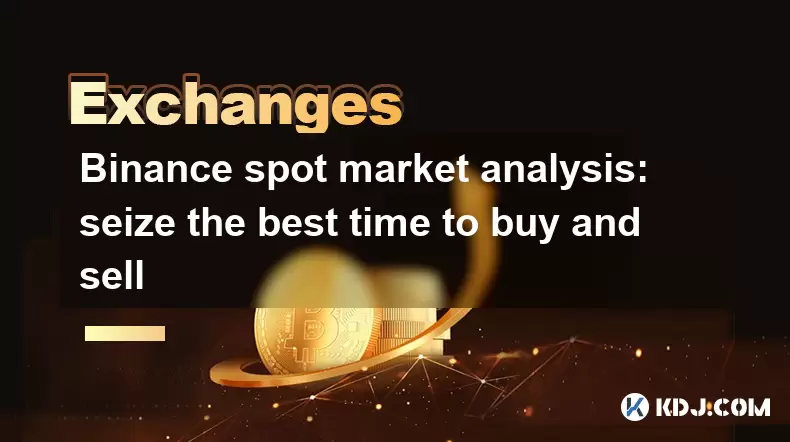
Binance spot market analysis: seize the best time to buy and sell
Jun 19,2025 at 04:56pm
Understanding the Binance Spot MarketThe Binance spot market is one of the most popular platforms for cryptocurrency trading globally. It allows users to trade digital assets at current market prices, making it essential for traders aiming to buy low and sell high. Unlike futures or margin trading, spot trading involves direct ownership of the asset aft...
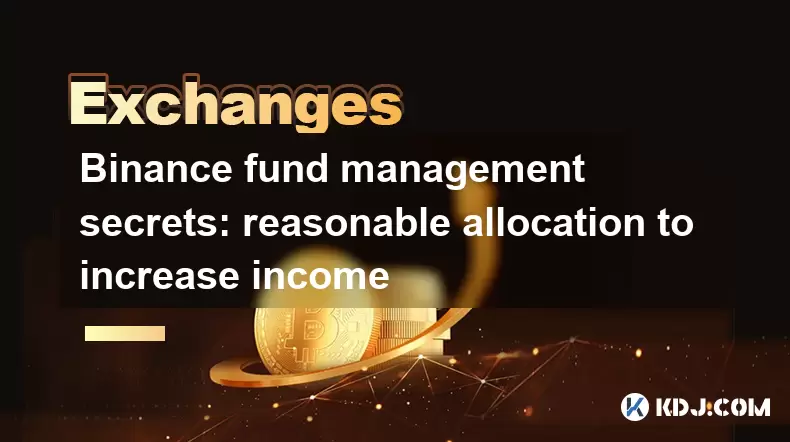
Binance fund management secrets: reasonable allocation to increase income
Jun 22,2025 at 02:29pm
Understanding Binance Fund ManagementBinance fund management involves strategic allocation of your cryptocurrency assets to optimize returns while managing risk. The key to successful fund management lies in understanding how different investment options on the Binance platform can be utilized to create a diversified portfolio. This includes spot tradin...
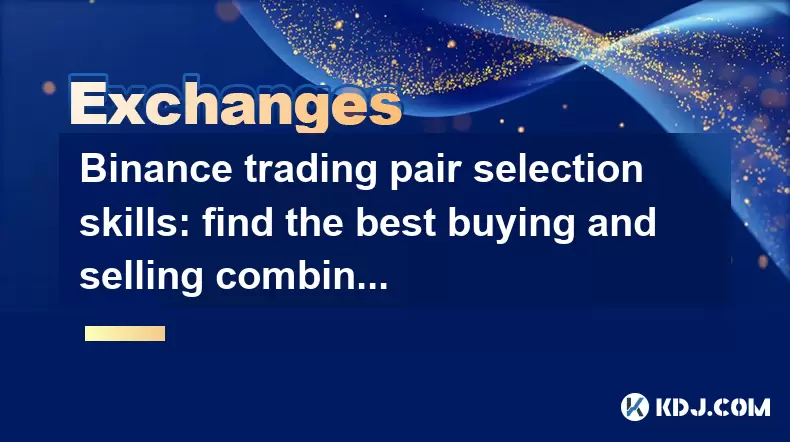
Binance trading pair selection skills: find the best buying and selling combination
Jun 23,2025 at 02:49am
Understanding the Basics of Trading Pairs on BinanceBefore diving into trading pair selection skills, it's essential to understand what a trading pair is. On Binance, a trading pair refers to two cryptocurrencies that can be traded against each other. For example, BTC/USDT means Bitcoin is being traded against Tether. Each trading pair has its own liqui...
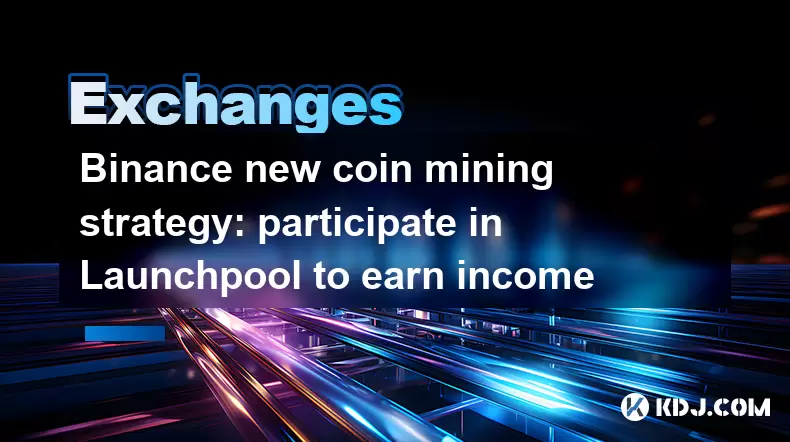
Binance new coin mining strategy: participate in Launchpool to earn income
Jun 23,2025 at 11:56am
What is Binance Launchpool and how does it work?Binance Launchpool is a feature introduced by the world’s largest cryptocurrency exchange, Binance, to allow users to earn new tokens through staking. This platform enables users to stake their existing cryptocurrencies (such as BNB, BUSD, or other supported assets) in exchange for newly launched tokens. T...
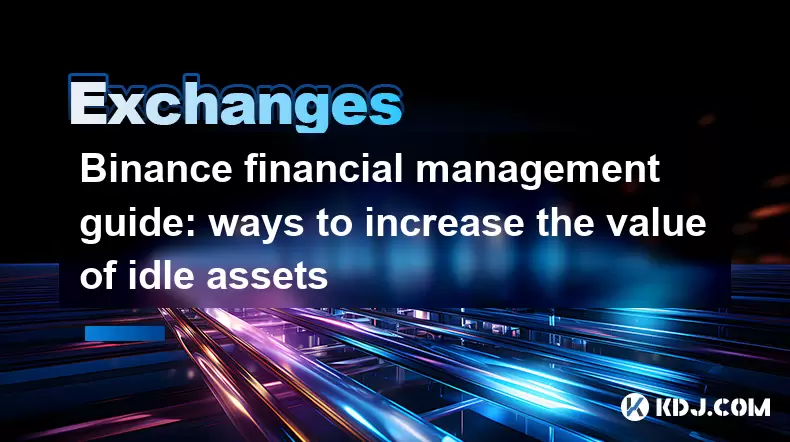
Binance financial management guide: ways to increase the value of idle assets
Jun 19,2025 at 11:22pm
Understanding Idle Assets in the Cryptocurrency SpaceIn the fast-paced world of cryptocurrency, idle assets refer to digital currencies that are not actively being used for trading, staking, or yield farming. Holding these funds in a wallet without utilizing them means missing out on potential growth opportunities. Binance, as one of the leading platfor...
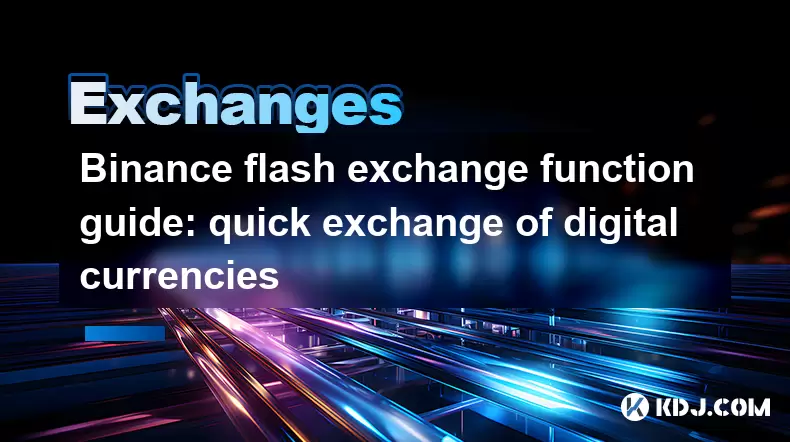
Binance flash exchange function guide: quick exchange of digital currencies
Jun 23,2025 at 12:29pm
What is the Binance Flash Exchange Function?The Binance Flash Exchange function is a powerful tool designed to allow users to instantly swap between supported cryptocurrencies without the need for placing traditional buy/sell orders. This feature simplifies the trading process by offering a direct exchange mechanism, eliminating the requirement to conve...

Binance spot market analysis: seize the best time to buy and sell
Jun 19,2025 at 04:56pm
Understanding the Binance Spot MarketThe Binance spot market is one of the most popular platforms for cryptocurrency trading globally. It allows users to trade digital assets at current market prices, making it essential for traders aiming to buy low and sell high. Unlike futures or margin trading, spot trading involves direct ownership of the asset aft...

Binance fund management secrets: reasonable allocation to increase income
Jun 22,2025 at 02:29pm
Understanding Binance Fund ManagementBinance fund management involves strategic allocation of your cryptocurrency assets to optimize returns while managing risk. The key to successful fund management lies in understanding how different investment options on the Binance platform can be utilized to create a diversified portfolio. This includes spot tradin...

Binance trading pair selection skills: find the best buying and selling combination
Jun 23,2025 at 02:49am
Understanding the Basics of Trading Pairs on BinanceBefore diving into trading pair selection skills, it's essential to understand what a trading pair is. On Binance, a trading pair refers to two cryptocurrencies that can be traded against each other. For example, BTC/USDT means Bitcoin is being traded against Tether. Each trading pair has its own liqui...

Binance new coin mining strategy: participate in Launchpool to earn income
Jun 23,2025 at 11:56am
What is Binance Launchpool and how does it work?Binance Launchpool is a feature introduced by the world’s largest cryptocurrency exchange, Binance, to allow users to earn new tokens through staking. This platform enables users to stake their existing cryptocurrencies (such as BNB, BUSD, or other supported assets) in exchange for newly launched tokens. T...

Binance financial management guide: ways to increase the value of idle assets
Jun 19,2025 at 11:22pm
Understanding Idle Assets in the Cryptocurrency SpaceIn the fast-paced world of cryptocurrency, idle assets refer to digital currencies that are not actively being used for trading, staking, or yield farming. Holding these funds in a wallet without utilizing them means missing out on potential growth opportunities. Binance, as one of the leading platfor...

Binance flash exchange function guide: quick exchange of digital currencies
Jun 23,2025 at 12:29pm
What is the Binance Flash Exchange Function?The Binance Flash Exchange function is a powerful tool designed to allow users to instantly swap between supported cryptocurrencies without the need for placing traditional buy/sell orders. This feature simplifies the trading process by offering a direct exchange mechanism, eliminating the requirement to conve...
See all articles























